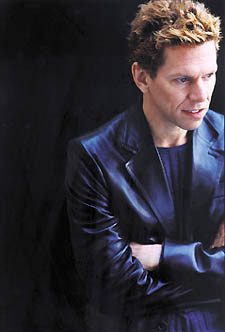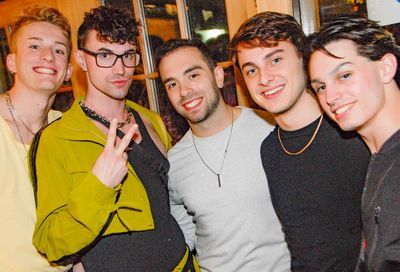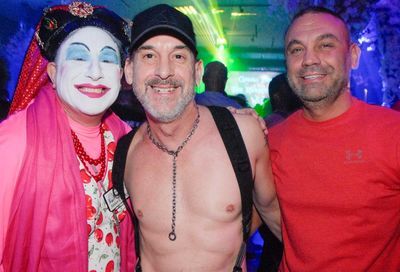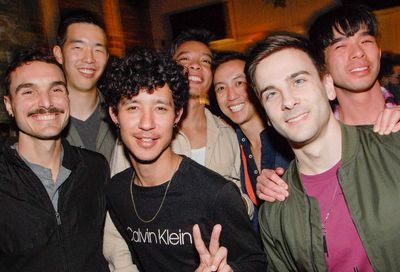Orchestral Maneuvers
Interview with Jonathan Sheffer of Eos Orchestra
 |
If anyone can get away with a techno remix of such revered American orchestral music as Aaron Copland’s Appalachian Spring, it’s Jonathan Sheffer.
“I don’t like to ghetto-ize classical music,” says Sheffer, the artistic director and conductor of the New York-based Eos Orchestra. Sheffer founded Eos in 1995 with a determination to maintain a hip approach to classical music programming by focusing on neglected works and innovative collaborations with other artistic disciplines, as well as eschewing traditional concert hall formality that can put off younger generations of concert-goers.
Created by London DJ Nick Woolfson and played as a fifteen-minute concert lead-in, the techno Copland track was one way, Sheffer thought, to assure audience members arriving for Celluloid Copland — the program Eos has been presenting on its first national tour, making a D.C.-area stop this weekend — won’t be a typical orchestra concert.
“I want there to be this transition from the kind of music people hear out on the street as they come into the concert hall,” Sheffer explains during a telephone call from a tour stop in Florida. “That makes a nice atmosphere. It gets the expectation up a bit. Then we have some home movies made of Aaron Copland that we show as people are settling down into their seats, to give you a sense of him. And I talk from the podium. There’s a lot going on in the course of the evening. We don’t just come out and play, and leave you to try to figure out what we’re doing.”
 |
For Celluloid Copland, Sheffer didn’t turn to Copland’s famous film scores, such as Our Town and Of Mice and Men. Instead, Sheffer chose to highlight such obscure work as Copland’s score for The City, created for the 1939 New York World’s Fair (and screened during the Eos concert), and The Cummington Story, a World War II-era government film that urged tolerance for refugees settling into new American lives. To that, Sheffer adds compositions by the expatriate novelist Paul Bowles — hearkening back to a Lincoln Center Bowles festival that was Eos’s very first undertaking — and the complete ballet score for Copland’s masterwork, Appalachian Spring.
It’s an eclectic mix that’s indicative of the type of offbeat programming choices that have made Eos — and Sheffer — a darling of New York’s cultural trendsetters. The orchestra returns to New York after its tour for its eighth winter-spring season, around which the 49-year-old, Harvard-educated Sheffer manages an array of professional pursuits, including composing, guest conducting and Eos recordings, notably a Celluloid Copland album that earned a Grammy nod last year.
Sheffer’s attraction to film as a complement to orchestral performance is natural, considering that he spent much of the ’80s and ’90s either composing or conducting dozens of Hollywood film scores, including Omen IV, Bloodhounds of Broadway, In a Shallow Grave, Michael Collins, Batman Forever, Interview with the Vampire, Alien 3 and A Time to Kill, as well as a slew of PBS American Playhouse productions.
And to those who dismiss Eos as a passing orchestral fad, consider this: leaders of the artistic community of Cleveland — a far cry from the whimsy-prone New York scene — enlisted Sheffer to overhaul and helm an existing chamber orchestra in the Eos mold. Sheffer was happy to oblige, and Red {an orchestra} is up and running, to much acclaim, this season in Cleveland — yet another item on Sheffer’s ever-expanding artistic agenda.
METRO WEEKLY: The gut reaction when you first hear about Eos tends to be, “avant-garde.” But you’re not doing new, experimental music necessarily.
JONATHAN SHEFFER: We do that as well. We rule nothing out. In fact, I don’t think it’s really possible to limit Eos. You know how actors are always saying, “I don’t want to be typecast, I want to do different things.” I feel the same way about this orchestra, which is that we refuse to be limited by other people’s expectations. We have been doing such a wide variety of things, and it’s been very, very fulfilling.
MW: Could you place a single label on the orchestra at this point?
SHEFFER: I think it’s the most interesting orchestra in the world. [Laughs.] I really do, to be quite honest. I go and I see what other people are doing, and I look for a similar kind of approach, and I don’t see it anywhere. I’m excited that we have something unique to offer. That’s very important to me. Someone asked me today, “Why do you like to find these unknown works?” Well, that’s just one part of what we do. That’s not the main thing. But the reason we look for those works is that people coming to our concerts, no matter how much music they know, are going to hear something they’ve never heard before. I don’t want to rule out the people that go to concerts a lot. I don’t want them to think, “Well, this is just another thing, why should I go to that?” We’re also offering something for those people.
MW: Would a “progressive” label work better for Eos?
SHEFFER: I like progressive. That’s a good word. Avant-garde is weird — it means so many different things to different people. It sounds like you might be throwing out the old just for its own sake, and that’s certainly not what we do. I’m very much interested in traditions. Progressive is a little more accurate.
MW: If the reality for longstanding orchestras is that it’s hard to stay afloat financially, how risky is it to start a new small orchestra and keep it going?
SHEFFER: Eos launched in ’95, which was a pretty good climate. Red, on the other hand, launched last year in what everyone says is a very bad economic environment. Yet that orchestra has managed to create an audience following and a financial following, so I try not to think about the climate and whether it’s difficult or not. We just do what we do.
The whole culture of symphony orchestras has to face the music, in a sense, because they’ve been doing business the same way for fifty years. Now the audience and economics are sort of saying to them, “You have to rethink what you do — what you play, how you program, how you market.” All of that is coming under reexamination. I’m very happy to be part of that reexamination. I feel that’s something of a very crucial service that we perform.
MW: What are your home audiences like for Eos and Red?
SHEFFER: The demographic is younger, it’s well-educated — and the buzz has been very good. I tend to draw an audience outside the traditional music world, in addition to people who really follow music. I have a very loyal following among people who love new things and know music well. But I also have a large art world audience from fashion and publishing. It’s a really nice, diverse audience. And there are people in there who are learning about classical music for the first time. They tell me that it’s the first time they’ve ever felt they could approach classical music and really get something out of it. I’m very happy about that.
|
MW: Is the “art crowd” drawn mainly by the visual elements you often add?
SHEFFER: I think they’re drawn by the visual elements and just the way we present ourselves, which is a little more informal. The content is a little more unusual. And every concert is an “event.”
MW: Copland has ended up playing a significant role in Eos’s work over the past few years. How did you first get onto the scent of this little-known Copland material that’s featured in the Celluloid Copland program?
SHEFFER: I was tipped off by a Copland biographer who mentioned that there were works in the Library of Congress. It piqued my curiosity, so I went down there and found them, and started to devise the program. It first appeared on a 1998 Eos program called Music from the 1939 World’s Fair. That led to our work for the PBS documentary Copland’s America, and then the Celluloid Copland CD. It’s been a really interesting, long process with Copland. I’m very happy to be able to take this music on tour right now in this kind of weird time we’re living in. It’s very meaningful to hear Copland right now.
MW: Even though your careers are separated by many decades, you really have a lot in common with Copland, considering that you share a film composing background in addition to classical concert work, and even being gay. Was there a specific coming out point in your career?
SHEFFER: Not really. I’ve been stewing about this for the last few days, because there are a lot of gay conductors out there, and I think it’s really important to be out if you’re a gay artist. If you’re a gay musician, a gay conductor, a gay actor — it doesn’t help our society for people to be in the closet when they’re public figures. We all know this. In music, if you leave out part of your personality, you’re really sort of shortchanging the audience. To be a gay musician and not be out is really only half of your art. I feel very strongly about this. And I don’t care about whatever ill effects will come from being out. Those things don’t matter to me anyway.
MW: Are people hesitant to be out at your level in the field?
SHEFFER: Yes, they are. There are quite a few [orchestral peers] that I could name. It’s very disappointing to me.
MW: Has it ever impacted your career negatively?
SHEFFER: I couldn’t say what’s gone on that I don’t know about. It’s never been brought to my attention specifically. But nobody ever would. It’s the kind of thing that operates in the shadows. I just think that openness — light — is the best way to chase away all the demons. There’s nothing to be gained by living in a kind of half-out existence.
MW: Has it made you more drawn to or passionate about artists such as Copland and Bowles?
SHEFFER: No, because I’m interested in the quality of the music first and foremost. Now, as it turns out, am I interested in a lot of gay composers? Yes, I happen to be. But that’s not because of the issue of sexuality. It’s because they happen to be great composers. I’m interested in a lot of straight composers, too.
MW: Because you not only shape the music of others as a conductor, you also create music of your own, how does your sexuality impact your craft?
SHEFFER: Sexuality is invisible in music, just in abstract terms. If you listen to music, you cannot discern a person’s sexuality. However, when it comes to subject matter — what you’re interested in writing about — what words you choose to set, what text, what figures and characters you care to include in your operas, what a piece might be entitled — that’s where you really have an opportunity to show your own taste and what things you’re interested in. That’s where sexuality can be expressed, because there’s words and ideas. So I am drawn to certain things. I wrote an opera about Gertrude Stein, Blood on the Dining Room Floor, but it’s almost unconscious — I wasn’t thinking about it when I was drawn to her.
 |
MW: Do you have a good sense of what subjects you want to cover in upcoming projects?
SHEFFER: I’m interested in writing more operas. I’m probably going to spend the next few months writing. I have a little string quartet I’ve been commissioned to do. I’m going to write some short operas because I love the form. I’d like to write another full-length opera eventually. But again, I don’t choose subjects because of their sexuality. It wouldn’t interest me. I can’t say why I’m drawn to something, but it isn’t like, “Oh boy, this would be an interesting gay opera.” I’ve never been really drawn to anything like that.
MW: What kind of stories have you told in your work so far? Any love stories?
SHEFFER: It’s hard to say — I haven’t written enough to have an identifiable strain of what I’m interested in.
MW: Have you been dealing with traditional narrative at all?
SHEFFER: No, I’m not interested in traditional narrative. I’m interested in slightly more unrealistic, fantasy narrative. Realistic narrative is a little bit “old.” We need new ways to tell stories. I haven’t been very free to compose, because I’ve been so busy making Eos and Red exist that I haven’t had the time to compose that I would like.
MW: What do you hope to change in the future so you will have that time?
SHEFFER: I have to take time for myself and stop what I’m doing. I just have to tell everyone that I’m not going to answer the phone for a few weeks, and just go and do it, which is hard because a lot of people depend on me for decisions. The planning we do is sometimes in a two-year cycle, and we’re already talking about concerts for 2005. There’s a lot of decisions that come along with that.
MW: Do you enjoy traditional, commercial musical theatre?
SHEFFER: I adore it. I’ve written two musicals. And I grew up thinking I was going to write musical theatre. That’s what I did when I was in my twenties.
MW: Tell us about them.
SHEFFER: One was called Ladies in Waiting, which was based on a television play, and the other one was called Going Hollywood, based on the Kaufman and Hart play Once in a Lifetime. That was the one I had really had high hopes for, although it didn’t succeed the way I’d hoped it would.
MW: Do you think you’ll ever aim for Broadway again at some point?
SHEFFER: It broke my heart. I don’t know if I could do that twice. I’ve sort of left it behind. But I don’t know, I’m always thinking about it, but it’s not so easy — and I’m very satisfied right now. It’s hard to say. It’s unfinished business with me.
MW: Who do you consider some of your greatest idols and influences?
SHEFFER: Certainly, Bernstein was a big one, and I was very fortunate to have contact with him. It was just very inspiring to me. He was at Harvard for a year as a visiting professor, and I was able to be part of a small invited seminar on music analysis, which was thrilling. And I was involved in a production of West Side Story that he helped out with — and that was very exciting. Then when I got to New York, I spent a lot of time with him and with the family. I actually went to Vienna and was allowed to observe him conducting the Vienna Philharmonic and recording Beethoven, which was a great experience.
I really tried to meet all the people I admired when I was younger. Stephen Sondheim was someone I got to know when I first moved to New York, and he’s been a tremendous figure in my life — a person who is such an extraordinary artist, and has such a high standard for himself. I think that’s a kind of role model that really inspires you when you’re young. He’s remained a friend throughout my life. I got to know people in the theatre mostly because that’s what I was interested in. I didn’t have many role models in classical music because I wasn’t really involving myself in that field until I was quite a bit older.
|
MW: What’s your take on the Hollywood scene? Was that a good creative environment for you during the time you spent working on films?
SHEFFER: Extremely. There’s extraordinary talent, and I learned an extraordinary amount about composing and conducting. It was a great experience for me. I just didn’t want to stay in movies. That wasn’t my particular passion.
MW: What are you most proud of in terms of your film work?
SHEFFER: I loved conducting Interview with the Vampire. That was a really wonderful project to work on. As far as composing, the most fun I had was a film called Bloodhounds of Broadway, which starred Madonna, among other people, and was a horrendous bomb. It was such a disaster — although I think it’s a charming film, and I was very proud of the music.
MW: Between your musicals and Bloodhounds, it sounds like you pretty much had an old-fashioned Tin Pan Alley vision of what you wanted to do at first.
SHEFFER: Absolutely.
MW: If you ever returned to musical theatre, would you be drawn to that kind of style?
SHEFFER: It’s hard to say. My opera Blood on the Dining Room Floor was completely a new direction for me, and I was allowed to follow my creative nose and see where it led me. And it led me in this very interesting direction. I don’t think it’s one thing or another. I have so many stylistic references. I’m very proud of that work. It got a lot of good attention [during its 2000 Off-Broadway run].
MW: What about working in New York these days? Is it going to be your best artistic home for the long haul?
SHEFFER: It’s changed. The ’90s was an amazing time. Everybody was doing everything. Everybody had lots of money, and everything seemed possible. Now we’re in a time when everything seems difficult. And I say “seems” because a lot of it is sort of appearances, and people who give to the nonprofit world may feel themselves squeezed in this market. But I think the need is still there. A lot of if has to do with perceptions, and this situation we’re in internationally certainly depresses people’s sense of adventure and entrepreneurship. We’ve got to try and get through that, because it’s having kind of a stranglehold on everyone.
Jonathan Sheffer leads the Eos Orchestra in a performance of Celluloid Copland at 8 p.m. on Saturday, March 1, in the Concert Hall at the George Mason University Center for the Arts, Braddock Road and Route 123 in Fairfax. An artistic discussion, free to ticket holders, begins at 7:15 p.m. on the Grand Tier of the Concert Hall. Tickets are $20 to $40. Call 703-218-6500. Visit www.gmu.edu/cfa and www.eosorchestra.org.
Support Metro Weekly’s Journalism
These are challenging times for news organizations. And yet it’s crucial we stay active and provide vital resources and information to both our local readers and the world. So won’t you please take a moment and consider supporting Metro Weekly with a membership? For as little as $5 a month, you can help ensure Metro Weekly magazine and MetroWeekly.com remain free, viable resources as we provide the best, most diverse, culturally-resonant LGBTQ coverage in both the D.C. region and around the world. Memberships come with exclusive perks and discounts, your own personal digital delivery of each week’s magazine (and an archive), access to our Member's Lounge when it launches this fall, and exclusive members-only items like Metro Weekly Membership Mugs and Tote Bags! Check out all our membership levels here and please join us today!



















